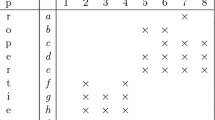Abstract
From quotient space based granular computing theory we explore the fuzzy measures of fuzzy sets. Based on the structural analysis of fuzzy sets, we present an “isotropism” assumption. Under this assumption we achieved the following insights: (1) the uniqueness of a fuzzy measure being isotropic on a finite complete semi-ordered set; (2) the necessary and sufficient condition of the isomorphism for fuzzy measure functions in fuzzy mathematics; (3) the necessary and sufficient condition that fuzzy measures have fuzzy and granular monotonicity; (4) under a certain assumption, the analytic expression for fuzzy measures. The results clarify the relationship between fuzzy measures and granular computing, reveal the essence of fuzzy measures, and provide a simple way of constructing fuzzy measures.
Similar content being viewed by others
References
Zadeh L A. Toward a theory of fuzzy information granulation and its centrality in human reasoning and fuzzy logic. Fuzzy Sets Syst, 1997, 90: 111–127
Hobbs J R. Granularity. In: Proc. of IJCAI, Los Angeles, USA, 1985. 432–435
Zadeh L A. Probability measures of fuzzy events. J Math Anal Appl, 1968, 23: 421–427
Sugeno M. Theory of fuzzy integrals and its application. Ph.D. Dissertation, Tokyo Institute of Technology, 1974
Sugeno M, Murofushi T. Pseudo-additive measures and integrals. J Math Anal Appl, 1987, 122: 197–222
Zhang D L, Guo C M. On the convergence of sequence of fuzzy measures and generalized convergence theorems of fuzzy integrals. Fuzzy Sets Syst, 1995, 72: 349–356
Wang Z Y, Klir G J, Wang W. Fuzzy measures defined by fuzzy Integral and their absolute continuity. J Math Anal Appl, 1996, 203: 150–165
Mesiar R. Possibility measures, integration and fuzzy possibility measures. Fuzzy Sets Syst, 1997, 92: 191–196
Klir G J, Wang Z Y, Harmanc D. Constructing fuzzy measures in expert systems. Fuzzy Sets Syst, 1997, 92: 231–264
Ha M H, Wang X Z, Wu C X. Fundamental convergence of sequences of measurable functions on fuzzy measure space. Fuzzy Sets Syst, 1998, 95: 77–81
Li X Q, Wang H, Li R X, et al. Extensions of a class of semi-continuous fuzzy measures. Fuzzy Sets Syst, 1998, 94: 397–401
Liu Y K, Zhang G Q. On the completeness of fuzzy measure space. Fuzzy Sets Syst, 1999, 102: 345–351
Jiang Q S, Suzuki H. Fuzzy measures on metric space. Fuzzy Sets Syst, 1999, 102: 345–351
Mesiar R. Generalizations of k-order additive discrete fuzzy measures. Fuzzy Sets Syst, 1999, 102: 423–428
Mesiar R. Fuzzy measures and integrations. Fuzzy Sets Syst, 2005, 156: 365–370
Ban A I, Gal S G. On the defect of complementarity of fuzzy measures. Fuzzy Sets Syst, 2002, 127: 353–362
Ban A I, Gal S G. On the defect of additivity of fuzzy measures. Fuzzy Sets Syst, 2002, 131: 365–380
Krasdhmer V. When fuzzy measures are upper envelopes of probability measures. Fuzzy Sets Syst, 2003, 138: 455–468
Guo C M, Zhang D L. On set-valued fuzzy measures. Inf Sci, 2004, 160: 13–25
Chakrabarty K, Biswas R, Nanda S. Fuzziness in rough sets. Fuzzy Sets Syst, 2000, 110: 247–251
He Y Q. New method for measuring fuzziness in rough sets. Trans Nanjing Univ Aeronaut Astronaut, 2004, 21: 31–34
Wang G Y, Zhang Q H. On the uncertainty of fuzzy sets under different knowledge granularities (in Chinese). J Comput Sci Tech, 2008, 31: 1588–1596
Liang J Y, Chin K S, Dang C Y. A new method for measuring uncertainty and fuzziness in rough set theory. Int J Gen Syst, 2002, 31: 331–342
Liang J Y, Shi Z Z. The information entropy, rough entropy and knowledge granulation in rough set theory. Int J Uncertainty Fuzz Knowl Based Syst, 2004, 12: 37–46
Liang J Y, Li D Y. The Uncertainty and Knowledge Acquisition of Information Systems (in Chinese). Beijing: Science Press, 2005
Zhao X F, Wei L L. The uncertainty measures of fuzzy rough sets (in Chinese). Trans Ninxia Univ, 2007, 28: 206–209
Qi X D, Liu Q S, Mi J S. The uncertainty measures of general fuzzy rough sets. Fuzzy Syst Math, 2007, 21: 136–139
Miao D Q. Information entropy and granular computing. In: Miao D Q, ed. Granular Computing: Past, Present and Future (in Chinese). Beijing: Science Press, 2007. 142–178
Delgado M, Moral S. Upper and lower fuzzy measures. Fuzzy Sets Syst, 1989, 33: 191–200
Banerjee M, Pal S K. Roughness of a fuzzy set. Inf Sci, 1996, 93: 235–246
Hu B Q. The Foundation of Fuzzy Theory (second version) (in Chinese). Transaction of Wuhan University, Wuhan, 2005
Yang L B, Gao Y Y. The Principle and Application of Fuzzy Mathematics (in Chinese). Guangzhou: South China University of Technology Publishing Company, 2004
Mao J J, Wu T, Zhang L. The interpretation of knowledge fuzzy measures of rough sets (in Chinese). submit to J Comput Sci Tech
Zhang L, Zhang B. The fuzzy quotient space theory (in Chinese). J Softw, 2003, 14: 770–776
Zhang L, Zhang B. The Theory and Applications of Problem Solving-The Theory and Applications of Quotient Space Based Granular Computing (in Chinese). 2nd ed. Beijing: Tsinghua University Publishing Company, 2007
Author information
Authors and Affiliations
Corresponding author
Rights and permissions
About this article
Cite this article
Zhang, L., Zhang, B. & Zhang, Y. The structural analysis of fuzzy measures. Sci. China Inf. Sci. 54, 38–50 (2011). https://doi.org/10.1007/s11432-010-4155-x
Received:
Accepted:
Published:
Issue Date:
DOI: https://doi.org/10.1007/s11432-010-4155-x




